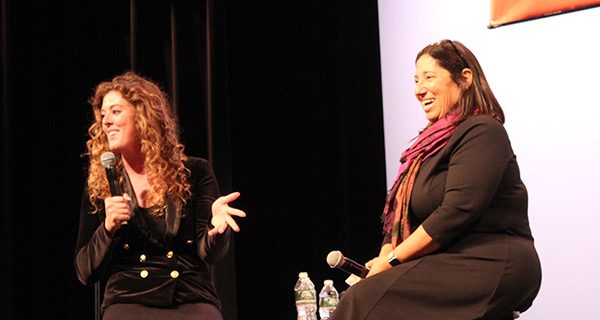[ccfic caption-text format="plaintext"]
By Laura Drinan
Hometown Weekly Reporter
If you’ve watched the past three Summer Olympic Games, you’ve probably heard the name Allison Schmitt announced a few times. Since her debut at the 2008 Summer Olympics in Beijing, Allison has become an eight-time Olympic medalist on the U.S. Olympic Swimming Team and has seen success at the World Aquatics Championships and the Pan American Games.
Despite her victories in the water, the overwhelming fame of being an Olympian hit Allison as she suffered from depression after returning from the 2012 Games. It was Allison’s experiences that inspired her to publicly speak about eliminating the stigmas attached to mental illnesses after her recovery. That inspiration brought her to the Norwood Theater on October 18.
The IAM Strong Foundation, a foundation in memory of Isabelle Alexandra Medina, who took her life at the age of 13, hosted the evening to bring awareness to and have conversations about mental illnesses, and to emphasize the importance of treatment.
“We really wanted to make sure this organization wasn’t just about the absence of Isabelle’s voice, but also for the one in five children and teens who suffer from mental illness,” said Emily Medina, Isabelle’s mother and one of the founders of IAM Strong. “Our goal was to start the conversation.”
That conversation is the one that allows those struggling with a mental illness, such as anxiety, depression, or PTSD, to talk to a trusted person about their issues and to ask for help. The foundation also aims to eradicate the isolation and stigmas associated with mental illness by having more open conversations about them.
Rather than asking Allison to deliver a speech about her struggles with depression, the IAM Strong Foundation asked her to join Cheryl Morrison Deutsch, one of the foundation’s board members, on stage for a discussion in front of the audience.
The pair discussed Allison’s childhood as the middle child of five, her first years as a swimmer (she hated her first season of swimming, she said), and her growing to enjoy the sport. She then spoke to the audience about her wildly successful career as a competitive swimmer.
However, Allison did not feel completely overjoyed by the public’s reception to her success.
“I didn’t know exactly how I felt, but I knew there was something wrong,” said Allison. “I didn’t want to say anything to anyone because I have had all of these successes, I’ve had great opportunities, I graduated captain of my swim team, I come from a great family, I had great schooling,” she continued. “Everything just seemed to fall in line, so what do I have to complain about?”
Allison’s teammate, Michael Phelps, was the one to confront her about her depression and offer help. “Ask for help,” said Allison, who revealed that she began counseling with a psychologist days after her conversation with Phelps. “I know from experience that that is the hardest thing to do. It makes training for the Olympics look easy.”
Although depression affects millions worldwide, Allison felt ashamed and only told her parents about her battle with depression, keeping it a secret from the rest of her family until her 17-year-old cousin’s suicide.
“It’s okay to feel upset, sad, angry. It’s a natural human instinct to have those different emotions, but it’s not okay not to say anything or ask for help,” she said.
While Allison does not currently have plans to compete in any upcoming competitions, her commitment to spreading awareness about mental illnesses and urging those struggling with depression to seek help is greater than any gold medal an athlete could win.

























